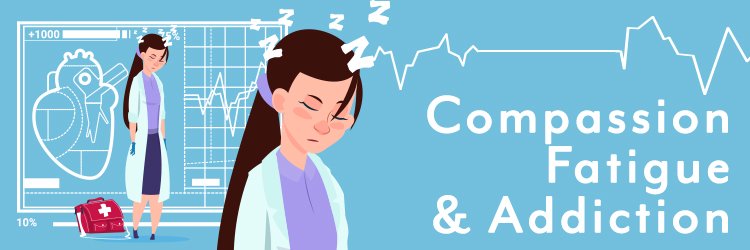[vc_row][vc_column][vc_column_text] It’s hard to be selfless. Which makes it hard to fathom that some people have to be selfless for a living. Nurses, surgeons, doctors and counselors, just to name a few. In each of these care-giving occupations, the professional takes on a lot of the stress or trauma that their patients or clients experience. This concept is called secondary traumatic stress, or Compassion Fatigue. The latter term was coined by Dr. Charles Figley in 1995. Compassion fatigue and alcoholism tend to go hand-in-hand. Sometimes being overly empathetic can take a toll on us, and alcohol or drugs might be the go-to method to quiet the distress.[/vc_column_text][vc_custom_heading text=”What is compassion fatigue?” use_theme_fonts=”yes”][vc_column_text]“Compassion Fatigue is a state experienced by those helping people or animals in distress; it is an extreme state of tension and preoccupation with the suffering of those being helped to the degree that it can create a secondary traumatic stress for the helper,” Figley said. Now a psychology and mental health academic, Figley experienced secondary traumatic stress syndrome while he was a first responder during the war in Vietnam. Wounded soldiers described injuries and horrifying acts of violence to Figley while he was treating them. Though he hadn’t experienced such combat firsthand, he began to internalize the trauma that others experienced. It greatly impacted his own well being. Compassion fatigue affects many dimensions of a caregiver’s well being. This includes spirituality and worldview, cognitive abilities and emotional responses, and identity, sense of self-worth and overall morale. [/vc_column_text][vc_custom_heading text=”Compassion fatigue and addiction” use_theme_fonts=”yes”][vc_column_text]
It’s hard to be selfless. Which makes it hard to fathom that some people have to be selfless for a living. Nurses, surgeons, doctors and counselors, just to name a few. In each of these care-giving occupations, the professional takes on a lot of the stress or trauma that their patients or clients experience. This concept is called secondary traumatic stress, or Compassion Fatigue. The latter term was coined by Dr. Charles Figley in 1995. Compassion fatigue and alcoholism tend to go hand-in-hand. Sometimes being overly empathetic can take a toll on us, and alcohol or drugs might be the go-to method to quiet the distress.[/vc_column_text][vc_custom_heading text=”What is compassion fatigue?” use_theme_fonts=”yes”][vc_column_text]“Compassion Fatigue is a state experienced by those helping people or animals in distress; it is an extreme state of tension and preoccupation with the suffering of those being helped to the degree that it can create a secondary traumatic stress for the helper,” Figley said. Now a psychology and mental health academic, Figley experienced secondary traumatic stress syndrome while he was a first responder during the war in Vietnam. Wounded soldiers described injuries and horrifying acts of violence to Figley while he was treating them. Though he hadn’t experienced such combat firsthand, he began to internalize the trauma that others experienced. It greatly impacted his own well being. Compassion fatigue affects many dimensions of a caregiver’s well being. This includes spirituality and worldview, cognitive abilities and emotional responses, and identity, sense of self-worth and overall morale. [/vc_column_text][vc_custom_heading text=”Compassion fatigue and addiction” use_theme_fonts=”yes”][vc_column_text]









